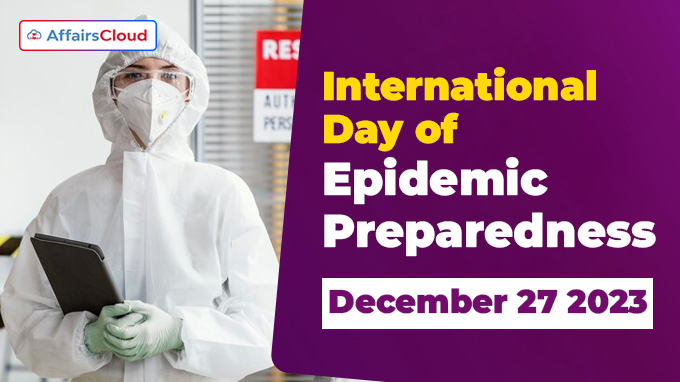 The United Nations (UN)’s International Day of Epidemic Preparedness is annually observed across the globe on 27th December to highlight the significance of the prevention of, preparedness for, and partnership against epidemics.
The United Nations (UN)’s International Day of Epidemic Preparedness is annually observed across the globe on 27th December to highlight the significance of the prevention of, preparedness for, and partnership against epidemics.
- 27 December 2023 marks the observance of the 4th International Day of Epidemic Preparedness.
Background:
i.On 7 December 2020, the United Nations General Assembly (UNGA) adopted the resolution A/RES/75/27 and proclaimed the 27 December of every year as the International Day of Epidemic Preparedness.
ii.The first International Day of Epidemic Preparedness was observed on 27 December 2020.
Epidemics:
i.An epidemic is a sudden disease outbreak that affects many people in a particular region, community, or population.
ii.They are the rapid spread of infectious diseases and are some of the leading threats to global health security.
- Epidemics can be influenced by environmental conditions like climate, sanitation, and population density, amplifying their impact.
UN’s Role in Global Epidemic Response:
i.The UN system, through the World Health Organisation (WHO), serves as a central coordinating body for global responses to epidemics.
- The mandate involves supporting national, regional, and international efforts to prevent, mitigate, and address the impacts of infectious diseases and epidemics.
ii.The efforts align with the broader goal of advancing the 2030 Agenda, emphasizing sustainable development.
- The Sustainable Development Goals (SDGs) Target 3.3, makes a bold commitment to end the epidemics of Acquired Immune Deficiency Syndrome (AIDS), tuberculosis, malaria, and other communicable diseases by 2030.
Role of WHO in Epidemic:
i.WHO works closely with governments to support efforts to build strong emergency and epidemic preparedness systems.
ii.This proactive approach aligns with the broader goal of advancing Universal Health Coverage (UHC) and strengthening primary healthcare systems.
iii.WHO is crucial in developing and implementing global strategies to prevent and control epidemic-prone diseases such as yellow fever, cholera, and influenza.
Flagship global strategies include:
- the Eliminate Yellow Fever Epidemics Strategy 2017- 2026;
- Ending Cholera: a Global Roadmap to 2030;
- the Pandemic Influenza Preparedness (PIP) Framework; and
- the Global Strategy for Influenza 2018-2030.
iv.WHO serves as the secretariat for the governance of global emergency stockpiles.
- This includes the International Coordinating Group on Vaccine Provision, which manages and coordinates the supply of emergency vaccines and antibiotics to countries during major outbreaks.
New COVID variant JN.1 emerges as “variant of interest”
On December 18, 2023, SARS-CoV-2 sub-variant JN.1 was classified as a seperate Variant of Interest (VOI) from its parent lineage BA.2.86 Omicron variant due to its rapid prevalence increase in recent weeks.
Previously, it was classified as VOI as a part of BA.2.86 sublineages.




